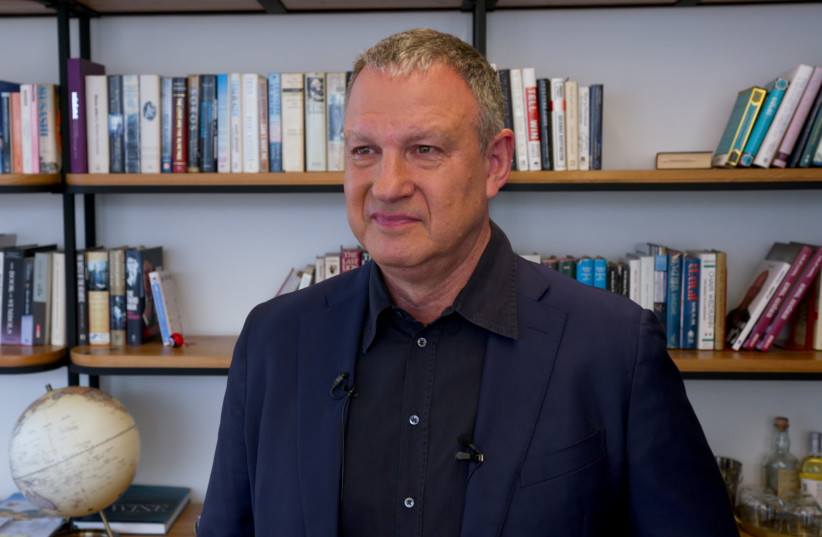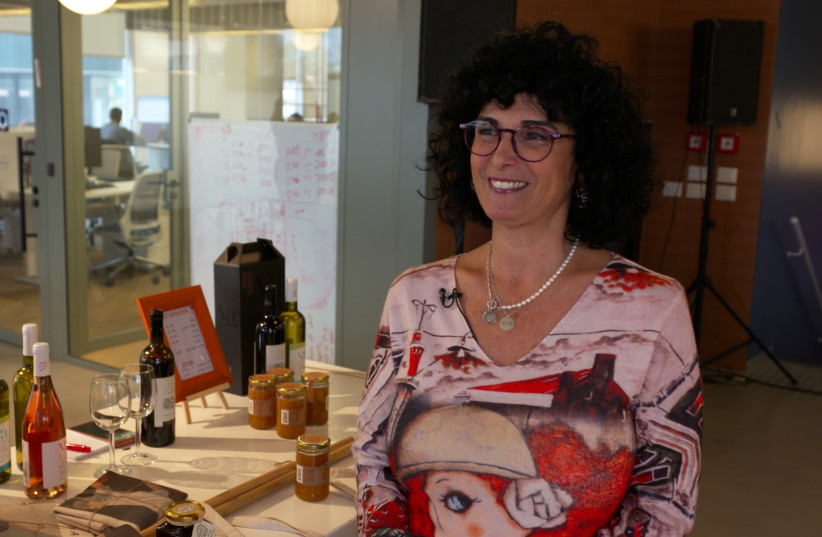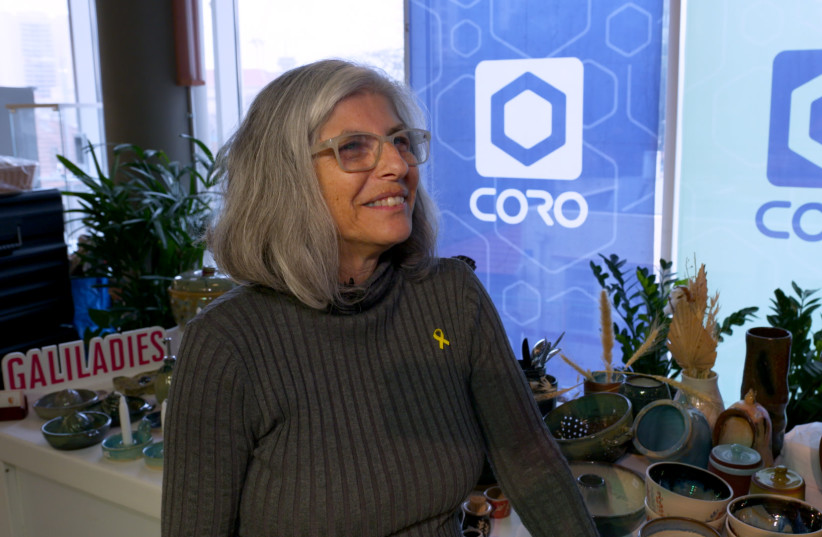“Citizens of the north must be allowed to return. Because every month that passes, we lose 10% of the population in the Galilee. And in three months, the Galilee will go bankrupt.”
For more stories from The Media Line go to themedialine.org
These are the foreboding words of former Israeli Knesset member and venture capitalist Erel Margalit as he addresses a crowded room full of female entrepreneurs from northern Israel.
Margalit’s speech, as well as keynote presentations by leading business experts and mentors, preceded the Galiladies open house event in Tel Aviv–a temporary boutique bazaar showcasing products and services run by a small portion of female-owned businesses and startups that were evacuated from northern Israel due to the ongoing war.
Stalls selling artisanal cheeses, wines, clothing, jewelry, aromatics and more spread out across two floors of the Rothschild 1 Tower, headquarters to the Margalit Startup City Tel Aviv. The event is also in partnership with Jerusalem Venture Partners (JVP), of which Margalit is also chairman and founder.
Tel Avivian passersby and others lured by the online ads arrived to see the gorgeous and delicious displays. They stayed for the mission of supporting small businesses, women entrepreneurs, and fellow Israelis who’ve been forced from their homes or who – in many cases – have closed up shop in order to report for duty in the Israeli military reserves.

Standing at her booth full of honey, wine, and painting-printed tote bags, “Galilady” and tourism business manager Adi Bar-Golan tells The Media Line that, because of the war, everything is closed.
“So I decided that instead of sitting at home and doing nothing, I’d help other businesses.”
Of the three businesses presented at Bar-Golan’s stall—the owners of the YA Winery and the Hakol Dvash honey manufacturers are both at present in the army reserves. The tote bags are made by an Israeli artist whose daughter, a dancer, is about the same age as party-goers murdered at the Nova Music Festival Massacre on October 7.
The proceeds from the bags, titled “A Bag with a Story,” go to the Step Towards Tomorrow foundation, which supports the survivors of the Nova festival as well as their families.
Journalist Elana Shap, who bought hand-crafted cheeses from the Galiladies-affiliated Grineli deli in Kibbutz Ortal, tells The Media Line that she heard about the event on Facebook and felt it incumbent upon her to support the businesses that were mandated to leave everything behind—particularly because she herself volunteered at Kibbutz Ortal 30 years ago, and because her son today lives in the southern Golan as a winemaker.
Israel's next entrepreneurial and business capitals
With the mission of developing Israel’s next entrepreneurial and business capitals away from central cities like Tel Aviv and Jerusalem, Margalit Startup Cities—of which there are six—are grassroots programs that draw upon and nurture local talent.

The entire community of Kiryat Shmona—among others—was forced to evacuate. However, when rockets launched by Hezbollah, the Iranian proxy terror group in Lebanon, began targeting them in earnest. Today, some 80,000 Israelis have been forcefully displaced from communities across the northern Israeli borders with Lebanon and Syria.
And every day the wars drag on, more decide never to return.
Deby Selas Dayan, Galiladies participant and artist behind the business Agua Life Ceramics, tells The Media Line that, while the global media may not be focused on Israel’s northern border, it’s no less affected than the border with Gaza.

“Most people are evacuated, which is terrible in and of itself … but also the people who stayed (in the Galilee) are in a war zone. There are missiles, sirens … It’s a war zone, even though there’s no ‘war.’ We are trying with all our power to keep our life going and to make things, to create, to live. But it’s hard.”
“The businesses need a timetable to come back, (and) the students need a timetable to come back,” Margalit told The Media Line. “You're asking me what I'm doing proactively; I'm not asking the stars. I'm putting my investment where my mouth is. We are making arrangements to come back to operate within our center, the Margalit Startup Cities, and within the food tech center within the next eight weeks. Whether it's going to begin in (Kibbutz) Mahanayim, which is a little bit further than Kiryat Shmona, and then go into Kiryat Shmona, or whether we're going to go right in—that depends on the situation.”
When asked by The Media Line what needs to be done to accomplish this return in the near future—particularly when many believe a larger war with Hezbollah is inevitable—Margalit ignores the doom and gloom predictions and instead insists upon forming an arrangement with Hezbollah or some other economic agreement instead of a major war.
“We can always find solutions,” he says. “But we’re getting back to the Galilee with economics, with residential, with social, with the students getting back to live in the Galilee… because that’s going to be the greatest image of victory—where we’re continuing to thrive and create and work in the Galilee. No one will take that away from us.”
In efforts to support businesses until they can return, as well as to draw government attention to the threats against the future development and business in the north overall, the Galiladies were invited for extended stays and additional mentorship in central Israel.
As for what the government can and should do, Margalit invokes US President Franklin Roosevelt’s New Deal; arguing that Israel needs a new deal on the economy for the north and south, where “you give major government incentives to businesses and to citizens that want to come back” and start small businesses.
“Israel needs a new paradigm both for security as well as for diplomacy,” he says.
In the meantime, according to Margalit, some 174 startups from the Upper Galilee are coming together; and the Margalit Startup City network as well as JVP are providing the guidance to see how to return, and how to survive until then.
